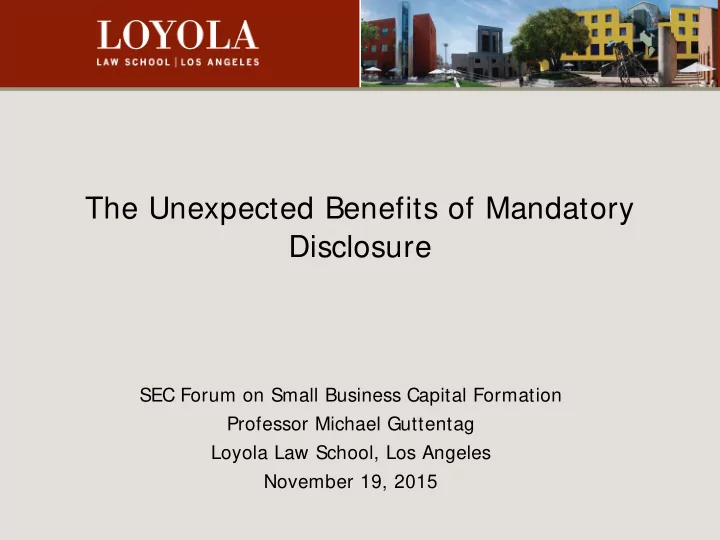

The Unexpected Benefits of Mandatory Disclosure SEC Forum on Small Business Capital Formation Professor Michael Guttentag Loyola Law School, Los Angeles November 19, 2015
Overview A. Objective: balance the costs and benefits of mandatory disclosure. B. Evidence: unexpected benefits from mandating disclosure.
B. Evidence of unexpected benefits from: 1. 1964 Exchange Act Amendments. 2. 1999 OTCBB mandatory disclosure rule. 3. The JOBS Act of 2012 .
1. 1964 Exchange Act Amendments: Provisions triggering periodic reporting obligations: Section 12(a) – Trading on a national exchange (1934) • Section 15(d) – After a public offering (1936) • • Section 12(g) – More than [$10] million in assets and 500 shareholders of record (1964) • Section 12(g) – Modified up to 2,000 shareholders (JOBS Act of 2012)
B. Evidence of unexpected benefits from forcing companies public and mandating disclosure. Economic Firms affected Event Consequence (median in 2015 $s) New filers shares rose 1964 Forced hundreds of OTC firms to between 11.5% and 22% Amendments file publicly ($68 mil. market cap.) (Greenstone et al., 2006).
2. 1999 OTCBB mandatory disclosure rule: Provisions required OTCBB firms to comply with periodic reporting obligations or exit OTCBB: • Before rule, 1,360 firms already complied with periodic reporting requirements, while over 3,600 firms did not. • Some firms (826) started to comply with periodic reporting requirements; most firms (2,600 or 76%) exited the OTCBB, rather than comply.
B. Evidence of unexpected benefits from forcing companies public and mandating disclosure. Economic Firms affected Event Consequence (median in 2015 $s) New filers shares rose 1964 Forced hundreds of OTC firms to between 11.5% and 22% Amendments file publicly ($68 mil. market cap.) (Greenstone et al., 2006). Forced hundreds of OTCBB Ongoing OTCBB filers 1999 SEC Rule firms to file publicly ($36 mil. shares rose 3.4% (Bushee market cap.) or exit. & Leuz, 2005).
3. The JOBS Act of 2012 . IPO On-Ramp provisions for Emerging Growth Companies (“EGCs”): • Confidential Submissions of Draft S-1 • Reduced disclosure at IPO: only 2 (vs. 3) years audited financials, less executive compensation disclosure • Phase-in periodic disclosure obligations: - Complying with new accounting standards (most EGCs opted out); - Auditor attestation of effectiveness of management internal controls over financial reporting (SOX 404(b)) (almost all EGCs do not include auditor’s attestation).
B. Evidence of unexpected benefits from forcing companies public and mandating disclosure. Economic Firms affected Event Consequence (median in 2015 $s) New filers shares rose 1964 Forced hundreds of OTC firms to between 11.5% and 22% Amendments file publicly ($68 mil. market cap.) (Greenstone et al., 2006). Forced hundreds of OTCBB firms Ongoing OTCBB filers 1999 SEC Rule to file publicly ($36 mil. market shares rose 3.4% (Bushee & cap.) or exit. Leuz, 2005). Direct costs unchanged; Reduced mandatory IPO JOBS Act of underpricing rose from disclosure obligations for 2012 14.5% to 24% (Berdejo, EGCs ($77 mil. sales). 2015).
Conclusions: 1. Mandatory public disclosure can benefit firms in unexpected ways (other studies support this). 2. I am not claiming that the specific information currently required to be disclosed is optimal. 3. We should hesitate before reducing disclosure obligations based on intuitions about cost/benefit tradeoffs.
5. Questions?
Recommend
More recommend